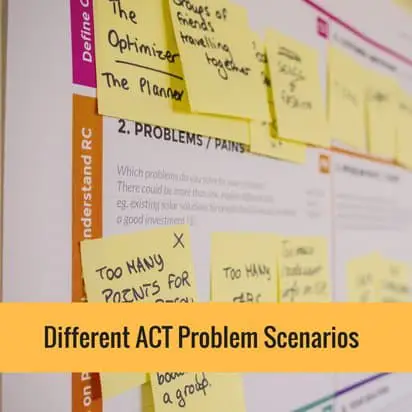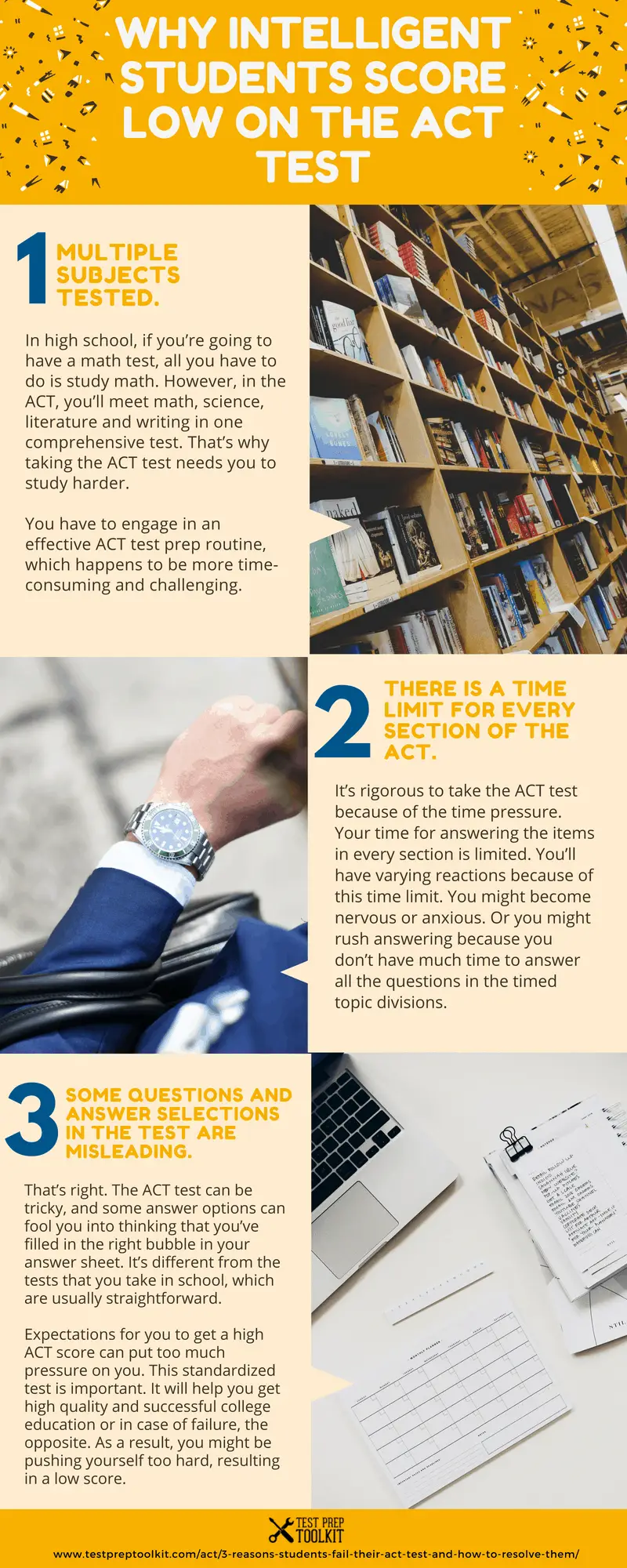It can be disappointing if you’re an achiever in high school but finished with a low score on the ACT test. If this happened to you, you’re not alone. This is a common problem, but there are ways to avoid it. Using effective techniques, you can be smart both in school and on the ACT test. First, you should understand why some intelligent students score low on standardized exams such as the ACT.
Start reviewing with our helpful contents: ACT Practice Tests for Math
Why Intelligent Students Score Low On The ACT Test

There are several reasons why smart students get low ACT scores and if you think you are going down the same path, being knowledgeable about these situations could give you some ideas. You see, standardized tests are different from the tests that you typically take in high school. Here are the reasons behind this problem:
1. Multiple subjects tested
In high school, if you’re going to have a math test, all you have to do is study math. However, in the ACT, you’ll meet math, science, literature and writing in one comprehensive test. That’s why taking the ACT test needs you to study harder. You have to engage in an effective ACT test prep routine, which happens to be more time-consuming and challenging. See our Free ACT Practice Test here.
Check our ACT Science Practice Tests
2. There is a time limit for every section of the ACT
It’s rigorous to take the ACT test because of the time pressure. Your time for answering the items in every section is limited. You’ll have varying reactions because of this time limit. You might become nervous or anxious. Or you might rush answering because you don’t have much time to answer all the questions in the timed topic divisions.
3. Some questions and answer selections in the test are misleading
That’s right. The ACT test can be tricky, and some answer options can fool you into thinking that you’ve filled in the right bubble in your answer sheet. It’s different from the tests that you take in school, which are usually straightforward.
Expectations for you to get a high ACT score can put too much pressure on you. This standardized test is important. It will help you get high quality and successful college education or in case of failure, the opposite. As a result, you might be pushing yourself too hard, resulting in a low score. Check out the ACT Scores here.
We have ACT Practice Tests for English
Different ACT Problem Scenarios

These are just some reasons students fail their ACT test, even though they are high achievers in school. The different scenarios below explain why:
Scenario #1
Your studying methods may be wrong. Did you prepare well for the ACT test? That is, did you spend enough time studying for it? On the day of the test, you may have had enough time to answer all the questions and you were not anxious. You were optimistic about the results, only to be disappointed by a low score. How come?
It is common for many students to get a low score on a standardized test, although they have studied enough for it. If such is the case for you, you might need to change your strategy for studying for the test. Even if you’re a math whiz in the classroom, it doesn’t always translate to a high ACT math score. Consider that in a standardized test, the math section covers more topics, which requires more skills and knowledge from you. Some questions are also phrased in confusing or misleading ways. This is why you can’t always expect your studying methods in the classroom to get you a high score on the ACT.
The resolution to the first scenario is to change the way you study. This means that in your ACT test prep, you should include familiarization with the topics that will be included and how you’re going to be tested on the ACT. Be aware of the types of questions given in the test and how they are worded.
Take plenty of practice tests, which will familiarize you with the real thing. At the same time, properly review each of your answers, particularly the incorrect ones. You need to be able to have a good grasp of your weak points in the test so you can improve on them.
Visit our website to learn more review materials: Practice Tests 1 for ACT Math
Scenario #2
You may have studied insufficiently for the ACT test because you were overconfident. Sometimes, high achieving students are used to acing tests in school that they think they can do the same on the ACT test. They expect the ACT test to be just as easy.
Consider that the ACT test is a different kind exam. You may become confused in answering the questions if you haven’t been exposed to them before. To measure how knowledgeable you are, the test makers of the ACT have deliberately designed many questions to be misleading and confusing. If you’re clueless about this strategy, you can be tricked easily resulting in a low score.
You can correct this tendency through practice and more practice. Arrange a regular study schedule a few months before taking or retaking the ACT test. Get hold of study guides from Test Prep Toolkit so that you can carry out a program that is most suitable for you. Taking practice tests is a must. Take 3-4 of them online or in your local library. Get used to the type of tests and the questioning strategies that tend to comprise the ACT test. Always take time to review your wrong questions, too, and figure out why you missed them. Knowing your weak points can make you better prepared to take the ACT test with all its peculiarity and intricacies.
You can also see our material for studying for ACT here to help you more on your ACT studies.
Related Topics:
- ACT Practice Test
- ACT (American College Testing) Test Guide – Registration, Test Dates & Scores
- Practice Tests for ACT Science
- How ACT Reviewers And Guides Help You Boost Your ACT Score
- Why You Need Help In Preparing For Your ACT Test
- ACT Test: Should You Aim For A High Score?
- ACT Registration and Requirements
- ACT Test Dates
- ACT Frequently Asked Questions
- History Of The ACT
- How To Get Good ACT Scores


